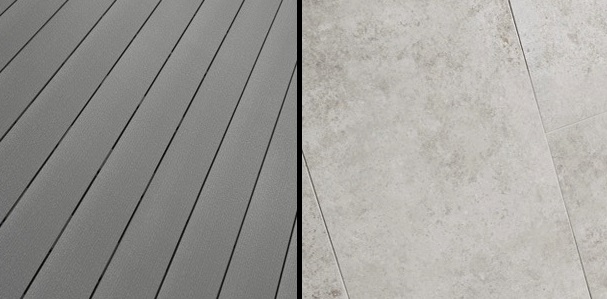In the world of garden design, outside of grassy lawns, there are two primary design options that stand head and shoulders above the rest: paved patios and wood decking.
These tried and tested options have long been duking it out for garden supremacy, consistently engaged in a tug-of-war of exterior design.
When it comes to finding a winner in this popularity contest, it’s hard to pick a standout victor. Thanks to modern innovations in porcelain paving and composite decking, both offer fantastic benefits that are truly hard to choose between.
With such a fine line between the two, the final decision ultimately has to come down to personal preference. With that being said, which one is right for you? Let’s run the garden gamut and find out.

Patio Magnifico
For a classy, stone-look surface, nothing beats the almighty awesomeness of the porcelain-powered patio paving.
Extremely durable, indistinguishable from the real thing and available in a wide variety of colours and patterns, our porcelain paving slabs offer a wealth of creative freedom when it comes to creating patio perfection.
AlfrescoPlus has one of the largest selections of porcelain paving designs in the UK, giving you ample choice and unrivalled freedom when it comes to formulating your outdoor design.
From light, Mediterranean warmth of the Turin Cream to the dark and stormy allure of the Slate Riven Black, we have a tile for all tastes and a patio for all personalities.
What’s more, porcelain boasts an extremely low porosity that absorbs very little moisture, making it highly resistant to water, as well as frost and ice. This gives it added traction and grip for reassuring slip resistance in a number of wet and icy conditions.
Best of all, all our porcelain tiles extremely low-maintenance, requiring very little TLC at all. Inherently scratch, fade and stain resistant, all you need to do is give them an annual jetwash to keep them looking as good as new!
Hit the Deck
If stone-look isn’t quite your cup of tea, the alternative is the wood-grained garden grandeur of composite decking.
A more than fitting replacement, composite decking from AlfrescoPlus is made from a combination of natural hardwood and synthetic materials, giving it an authentic aesthetic appeal with the unparalleled durability of modern technology.
Composite decking boards never have to be sealed, painted or stained to retain their visage, while they will also never crack, splinter or bow. Each board is also capable of retaining its grip even under harsh conditions, engineered to be resistant to rain and frost.
Available in a variety of colours, shades and designs, our collection also caters for all manner of budgets. What’s more, our impressive warranties also provide unrivalled peace of mind, proof that your deck will last.
From a maintenance standpoint, each deck board is made for independence and requires very little upkeep to retain its looks. An occasional once over with warm, soapy water when necessary will be all it needs to return to its original glory.
Deck Out Your Patio
So, you’ve heard both sides of the argument and are still torn like Natalie Imbruglia. Now what?
Well, who’s to say you have to choose between the two at all? There’s always the option to blend the two using the art of zoning in your exterior design.
Garden zoning is an increasingly popular trend in outdoor design that sees your garden effectively split into sections (or “zones”) with a different setting for specific activities or ambiences. This method allows you to incorporate a patio with decking, all in one garden.
A great example of zoning is the standard three-part split. Imagine a rectangular garden: you step out the back door onto a paved patio, which leads onto a grass lawn with a raised deck area at the bottom of the garden.
From a zoning POV, the initial patio creates the ideal area for alfresco dining and barbeques; the grass is perfect for kids and pets to run, play and enjoy; while the decked base of the garden is tailor-made for relaxing and unwinding.
Naturally, the extent of the combination is entirely up to you and how you blend the two is restricted only to your own imagination. If you have a particular combination, design or layout in mind, we can make it happen.
For more information and advice on which garden design is right for you, why not drop us a line today and speak with one of our experts? Call now on 0800 028 8756 or send us an email with your queries using the button below.
Get in Touch